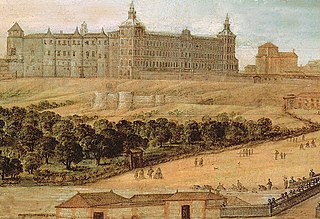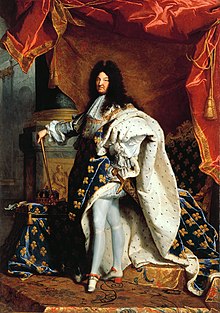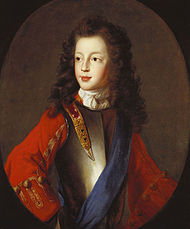I: The Spanish Succession
I
The Spanish Succession
1665-1700
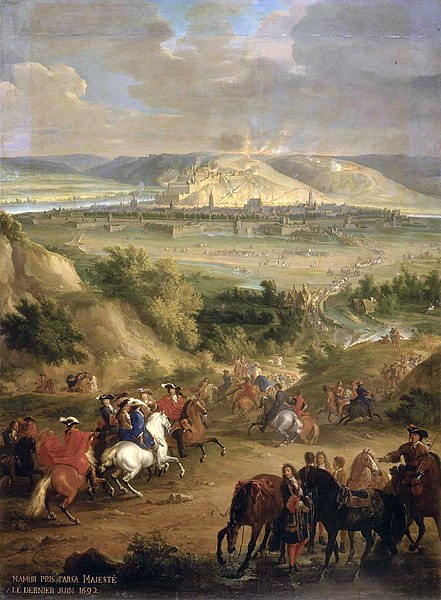
Siege of Namur, 1692 by Jean-Baptiste Martin (a.k.a. Martin des Batailles)
Europe as a whole was a continent embroiled in tension. Fourteen years prior, Eastern Europe had borne witness to the return of massive Turkish armies across Central Europe. Though they were pushed back after their latest siege at Vienna, the decision of the Bourbon Monarchs of France to capitalize on perceived Imperial distractions, laid the foundations for the latest in a series of wars between the Sun King, Louis XIV and his various rivals, the War of the Grand Alliance. The conflict saw the use of massive armies, unheard of even during the waning days of the Thirty Years’ War and perceived unsustainable even during the age fight in climatic battles.
The defection of the Duchy of Savoy from the alliance, coupled with the financial crisis plaguing both France and two major Alliance members, England and the United Provinces saw an end to the conflict, and the Treaty of Rijswijk saw peace reign once more. But it seemed that a new conflict would be waiting to begin before the ink even began drying.
Carlos II, the King of Spain since 1665, was ailing. While this would normally not be an issue for a normal monarch, Carlos II was anything but. He was the product of severe inbreeding, all eight of his great-grandparents were descendents of Juana and Felipe I, the Queen and King of Castile. Suffering from ill-health his whole life and rendered sterile as a result of inbreeding, the question of the Spanish Succession had been plaguing Spanish domestic policy, as well as Europe’s foreign policy. Despite Spain no longer being the premier power in Europe, (that distinction having since passed to powers such as France, England and the Netherlands.) it still controlled a vast Empire.
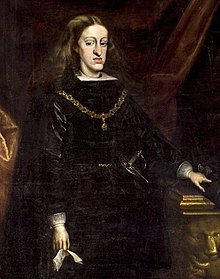
Carlos II, the Last Habsburg King of Spain
Within Europe alone, it control the lands of Milan, Sardinia, Naples, Sicily and various princely states in the Southern Netherlands. Beyond this, was the vast Colonial Empire built up over the course of the previous two centuries, a source of immense prestige, wealth and goods to help along the Spanish economy. (despite its decrepit shape) Yet the kingdom suffered immensely from mismanagement stemming back to the early Habsburg monarchs, something that served to bite them in the derriere economically and eroded their potential as a Great Power, and it seemed its time was at an end with presumably, the last Habsburg Monarch.
But one caveat about the Crisis was in Spain’s succession system. Spain was one of a number of monarchies that followed the law of cognatic primogeniture, in that females and sons & daughters born from the female line could inherit the throne should the male line of the dynasts were to die out. This would serve as the main crux of the issue, as after Carlos II comes the descent of his half-sister María Teresa, and his full sister, Margarita Teresa. Both step sisters could transmit their claims to their children, the former transmitted hers to the children and grandchildren of the Sun King, Louis XIV, while the latter transmitted hers through her daughter with Emperor Leopold I.


Left: Maria Teresa de Austria (French: Marie-Thérèse d'Autriche), eldest surviving daughter of Felipe IV and wife to King Louis XIV of France
Right: Margarita Teresa (German: Margarete Theresia), daughter of Felipe IV with his second wife, and wife to Leopold I, Holy Roman Emperor
With Carlos II nearing death’s doorstep, and the western European powers not inclining for war, representatives from England, the Netherlands and France met at the Hague to discuss what to do with regards to the Spanish Succession as well as what they could gain from this.
The first matter of debate was whom was to succeed Carlos II. Immediately, the French put their preferred candidate, Louis. Louis was the Dauphin of France, the eldest son (and after 1672, his only surviving legitimate-born son) and thus heir to the throne of France. He was also the son born to the eldest daughter of Felipe IV, María Teresa. As a further argument (one that led to the War of Devolution in 1667-1668) was that the dowry that was to be paid to France from Spain, was never paid (as Spain never had the ability to do so) and as such, the previous agreement regarding the renunciation of the former Queen of France’s claims to the Spanish throne was invalidated. As many in Europe feared a Franco-Spanish personal union, which would upset the balance of power heavily in France’s favor (coupled with France gaining near-total hegemony in the Americas) he was immediately rejected.
Another potential candidate was another Habsburg. Leopold I, Leopold I had married the other surviving daughter of Felipe IV, Margarita Teresa, and sired four children with him before her death in 1673, two boys and two girls. However, of those four, only one, Maria Antonia survived infancy. This did not deter the Emperor. Despite his weaker claim compared to his French rivals, he had himself a smaller claim, as his maternal grandfather was King Felipe III. This was something that he could pass on to his two surviving sons, the Archdukes Joseph and Karl. Like the Grand Dauphin however, both were high up on the succession to the myriad of thrones that make up the Habsburg monarchy, to say nothing of the prestigious yet politically impotent Imperial throne. Because the other powers balked at the idea of a return to the Empire of Karl V, they too were passed aside.

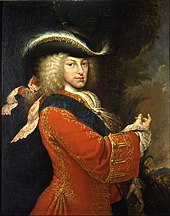

Left: Louis, Dauphin of France, who was known as Le Grand Dauphin after the birth of his own son, also named Louis (nicknamed Le Petit Dauphin and styled Duke of Burgundy)
Center: Philippe, the second son of Le Grand Dauphin, and Duke of Anjou, who was also considered for the Spanish Succession
Right: Archduke Karl of Austria, the youngest son of Kaiser Leopold I. Due to being born to the Kaiser's third wife, Eleonore Magdalene, his claim was thus weaker than the French candidates, though no less important.
But there was still a potential for Maria Antonia, who her mother's claim was transferred to. She had married into the House of Wittelsbach, specifically Bavaria’s Elector, Maximilian II Emmanuel. Through this marriage, she gave birth to three children, of which only one, Joseph Ferdinand, survived childbirth.
Though the Electress consort died from complications stemming from his birth, the young child served not only as heir to his father's throne in Bavaria, but was a superb candidate, as Carlos II’s second cousin, to succeed the infirm man to the Spanish throne. It was further helped that the Queen of Spain, Maria Anna of Neuburg (known in Spain as Queen Mariana) was a member of the House of Wittelsbach, (albeit of a different branch, she was the daughter of the Count Palatine of Neuburg, alongside that of Leopold’s current wife and the Queen’s sister, Empress Eleonore Magdalene) and was the leader of the pro-Austrian faction in the Spanish court. In addition, Joseph Ferdinand had ties to the Austrian Habsburgs through his mother, as well as the Bourbons.[1]
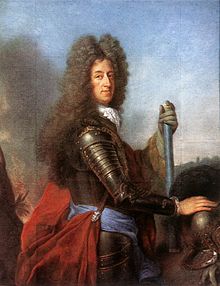


Father, Mother and Child: From Left to Right, Maximilian II Emanuel (also known as Max Emanuel or Maximilian Emanuel), His Wife Maria Antonia, daughter of Kaiser Leopold I with his first wife, Margarita Teresa, and their sole surviving child, Joseph Ferdinand.
The parties would acquiesce on Joseph Ferdinand. The boy would become Carlos’ heir, and in exchange, France would gain the Kingdom of Naples and Sicily as well as the Spanish Lordship of Gizpukoa (alongside the albeit minor State of Presidi & Marquisate of Finale), while Archduke Karl, the younger son of the Holy Kaiser would receive the Duchy of Milan, thus giving the territory nominal independence for the first time since 1535. With the terms agreed to, the Treaty of the Hague, also known as the Partition Treaty would be signed on 11 October 1698 by the three powers.
The whole affair was conducted in secret, which while was the normal manner of business within absolutist France, it had caused a scandal in English (and to a lesser extent, Dutch) politics, to the point where the Lord Chancellor of England, Lord Baron John Somers would suffer attacks and attempts by his political opponents to be sacked (or worse.) Worse yet, the Spanish government, upon finding out of the treaty led Carlos II to develop his own solution. He would publish his will on 14 November 1698. In this, Carlos II named Joseph Ferdinand his heir over the undivided Spanish monarchy as a whole. Worse yet was the move of the French, placing Henry, Marquis d’Harcourt as French ambassador to Spain, and using his position to push for Le Grand Dauphin to be made Spanish King.
Despite these matters, the deal was set. At the time of the signing of the treaty , Joseph Ferdinand was at the informal capital of the Spanish Netherlands, Brussels, to be confirmed by the States of Flanders as heir to the Spanish throne. During this period there was a serious attempt to poison the boy, but the attempt was foiled.[2] Although there were suspicions of France being responsible for the attempted poisoning of Joseph Ferdinand, who would have had more to gain with the elector’s death, because the conspirators died under torture, nothing was proven.

Bruxelles (circa 1610), The city had been devastated following the War of the Grand Alliance, and although mostly recovered, there was still much reconstruction underway.
Regardless of the matter, there was little that could be in the way now. On 14 March 1699, Joseph Ferdinand was confirmed by the Flemish Estates as heir to Carlos. This would be followed by a trip to Spain proper, meeting first with the Catalonian Estates in Barcelona, and later the Aragonese Cortes in Zaragoza over the summer months of 1699. Finally, on 19 September 1699, Joseph Ferdinand would meet with his ailing yet somewhat able cousin, King Carlos II, at the Royal Alcázar of Madrid. The young boy made an impression on Carlos II, who firmly believed that through José, the future of Spain as a Great Power would continue, the legacy of great Spanish rulers from Saint Fernando III to Felipe II would be kept.
It would be here that the decision on regency would be finalized, as it was unlikely Carlos II would survive to see José reach the age of majority. It was decided that the man to handle the head of the regency would be Cardinal Luis Manuel Fernández de Portocarrero, the Archbishop of Toledo and Primate of Spain. The other prominent members of the regency council to be would be Queen Mariana as well as her cousin, the Elector of Bavaria, Max Emanuel (who was keen in the interests of his son, of whom he had very high aspirations for.)
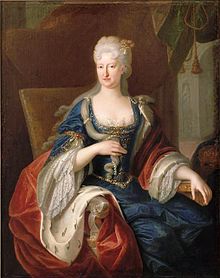
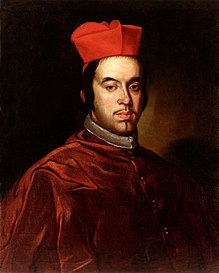
Left: Maria Anna (Spanish: Mariana) von Pfalz-Neuburg, Queen of Spain and leader of the pro-Austrian faction in court, taking over from the late Queen Dowager Maria Anna (Spanish: Mariana) of Austria.
Right: Luis Manuel Fernández de Portocarrero, Cardinal-Primate of Spain and leader of the pro-French faction in court
With that settled, it seemed that the succession for the young prince would be as smooth as possible, and all that would remain would be to, in a grim way, wait for Carlos II to croak. While this would finally happen by the first of November 1700, it seemed that the rigors of succession would still have a few bumps ahead.
----
[1]: Joseph’s uncle was Le Grand Dauphin, and therefore cousins to the Duke of Burgundy, Louis; the Duke of Anjou, Philippe; and the Duke of Berry, Charles.
[2]: The PoD. Okay, yes, I know that historically (and probably by contemporary sources) Joseph Ferdinand’s death was caused by smallpox. But since there was suspicions of poisoning, I went with that instead.
----
So hey, my first timeline...after joining five years...I'm not sure if I should feel proud or depressed now...
...All kiddings aside, this will focus (mainly) on the Spanish Empire as a whole, one not ruled by the usual Spanish TL candidates (Trastamaras, Habsburgs, Bourbons & Hohenzollerns...also Savoyards, but they're rarer than the above four), although I do have some ideas on what directions to take for the other nations involved (France, Italian States, New World et.al.) With plans to take it to at the very least, 1990.
Now I'm no expert on Spanish history (or really an expert on history in general), so feel free to criticize if needed if I screw up, and lets be real, I will screw up, but I'll have fun with it, and I hope you all will to.
The Spanish Succession
1665-1700

Siege of Namur, 1692 by Jean-Baptiste Martin (a.k.a. Martin des Batailles)
Europe as a whole was a continent embroiled in tension. Fourteen years prior, Eastern Europe had borne witness to the return of massive Turkish armies across Central Europe. Though they were pushed back after their latest siege at Vienna, the decision of the Bourbon Monarchs of France to capitalize on perceived Imperial distractions, laid the foundations for the latest in a series of wars between the Sun King, Louis XIV and his various rivals, the War of the Grand Alliance. The conflict saw the use of massive armies, unheard of even during the waning days of the Thirty Years’ War and perceived unsustainable even during the age fight in climatic battles.
The defection of the Duchy of Savoy from the alliance, coupled with the financial crisis plaguing both France and two major Alliance members, England and the United Provinces saw an end to the conflict, and the Treaty of Rijswijk saw peace reign once more. But it seemed that a new conflict would be waiting to begin before the ink even began drying.
Carlos II, the King of Spain since 1665, was ailing. While this would normally not be an issue for a normal monarch, Carlos II was anything but. He was the product of severe inbreeding, all eight of his great-grandparents were descendents of Juana and Felipe I, the Queen and King of Castile. Suffering from ill-health his whole life and rendered sterile as a result of inbreeding, the question of the Spanish Succession had been plaguing Spanish domestic policy, as well as Europe’s foreign policy. Despite Spain no longer being the premier power in Europe, (that distinction having since passed to powers such as France, England and the Netherlands.) it still controlled a vast Empire.

Carlos II, the Last Habsburg King of Spain
Within Europe alone, it control the lands of Milan, Sardinia, Naples, Sicily and various princely states in the Southern Netherlands. Beyond this, was the vast Colonial Empire built up over the course of the previous two centuries, a source of immense prestige, wealth and goods to help along the Spanish economy. (despite its decrepit shape) Yet the kingdom suffered immensely from mismanagement stemming back to the early Habsburg monarchs, something that served to bite them in the derriere economically and eroded their potential as a Great Power, and it seemed its time was at an end with presumably, the last Habsburg Monarch.
But one caveat about the Crisis was in Spain’s succession system. Spain was one of a number of monarchies that followed the law of cognatic primogeniture, in that females and sons & daughters born from the female line could inherit the throne should the male line of the dynasts were to die out. This would serve as the main crux of the issue, as after Carlos II comes the descent of his half-sister María Teresa, and his full sister, Margarita Teresa. Both step sisters could transmit their claims to their children, the former transmitted hers to the children and grandchildren of the Sun King, Louis XIV, while the latter transmitted hers through her daughter with Emperor Leopold I.


Left: Maria Teresa de Austria (French: Marie-Thérèse d'Autriche), eldest surviving daughter of Felipe IV and wife to King Louis XIV of France
Right: Margarita Teresa (German: Margarete Theresia), daughter of Felipe IV with his second wife, and wife to Leopold I, Holy Roman Emperor
With Carlos II nearing death’s doorstep, and the western European powers not inclining for war, representatives from England, the Netherlands and France met at the Hague to discuss what to do with regards to the Spanish Succession as well as what they could gain from this.
The first matter of debate was whom was to succeed Carlos II. Immediately, the French put their preferred candidate, Louis. Louis was the Dauphin of France, the eldest son (and after 1672, his only surviving legitimate-born son) and thus heir to the throne of France. He was also the son born to the eldest daughter of Felipe IV, María Teresa. As a further argument (one that led to the War of Devolution in 1667-1668) was that the dowry that was to be paid to France from Spain, was never paid (as Spain never had the ability to do so) and as such, the previous agreement regarding the renunciation of the former Queen of France’s claims to the Spanish throne was invalidated. As many in Europe feared a Franco-Spanish personal union, which would upset the balance of power heavily in France’s favor (coupled with France gaining near-total hegemony in the Americas) he was immediately rejected.
Another potential candidate was another Habsburg. Leopold I, Leopold I had married the other surviving daughter of Felipe IV, Margarita Teresa, and sired four children with him before her death in 1673, two boys and two girls. However, of those four, only one, Maria Antonia survived infancy. This did not deter the Emperor. Despite his weaker claim compared to his French rivals, he had himself a smaller claim, as his maternal grandfather was King Felipe III. This was something that he could pass on to his two surviving sons, the Archdukes Joseph and Karl. Like the Grand Dauphin however, both were high up on the succession to the myriad of thrones that make up the Habsburg monarchy, to say nothing of the prestigious yet politically impotent Imperial throne. Because the other powers balked at the idea of a return to the Empire of Karl V, they too were passed aside.



Left: Louis, Dauphin of France, who was known as Le Grand Dauphin after the birth of his own son, also named Louis (nicknamed Le Petit Dauphin and styled Duke of Burgundy)
Center: Philippe, the second son of Le Grand Dauphin, and Duke of Anjou, who was also considered for the Spanish Succession
Right: Archduke Karl of Austria, the youngest son of Kaiser Leopold I. Due to being born to the Kaiser's third wife, Eleonore Magdalene, his claim was thus weaker than the French candidates, though no less important.
But there was still a potential for Maria Antonia, who her mother's claim was transferred to. She had married into the House of Wittelsbach, specifically Bavaria’s Elector, Maximilian II Emmanuel. Through this marriage, she gave birth to three children, of which only one, Joseph Ferdinand, survived childbirth.
Though the Electress consort died from complications stemming from his birth, the young child served not only as heir to his father's throne in Bavaria, but was a superb candidate, as Carlos II’s second cousin, to succeed the infirm man to the Spanish throne. It was further helped that the Queen of Spain, Maria Anna of Neuburg (known in Spain as Queen Mariana) was a member of the House of Wittelsbach, (albeit of a different branch, she was the daughter of the Count Palatine of Neuburg, alongside that of Leopold’s current wife and the Queen’s sister, Empress Eleonore Magdalene) and was the leader of the pro-Austrian faction in the Spanish court. In addition, Joseph Ferdinand had ties to the Austrian Habsburgs through his mother, as well as the Bourbons.[1]



Father, Mother and Child: From Left to Right, Maximilian II Emanuel (also known as Max Emanuel or Maximilian Emanuel), His Wife Maria Antonia, daughter of Kaiser Leopold I with his first wife, Margarita Teresa, and their sole surviving child, Joseph Ferdinand.
The parties would acquiesce on Joseph Ferdinand. The boy would become Carlos’ heir, and in exchange, France would gain the Kingdom of Naples and Sicily as well as the Spanish Lordship of Gizpukoa (alongside the albeit minor State of Presidi & Marquisate of Finale), while Archduke Karl, the younger son of the Holy Kaiser would receive the Duchy of Milan, thus giving the territory nominal independence for the first time since 1535. With the terms agreed to, the Treaty of the Hague, also known as the Partition Treaty would be signed on 11 October 1698 by the three powers.
The whole affair was conducted in secret, which while was the normal manner of business within absolutist France, it had caused a scandal in English (and to a lesser extent, Dutch) politics, to the point where the Lord Chancellor of England, Lord Baron John Somers would suffer attacks and attempts by his political opponents to be sacked (or worse.) Worse yet, the Spanish government, upon finding out of the treaty led Carlos II to develop his own solution. He would publish his will on 14 November 1698. In this, Carlos II named Joseph Ferdinand his heir over the undivided Spanish monarchy as a whole. Worse yet was the move of the French, placing Henry, Marquis d’Harcourt as French ambassador to Spain, and using his position to push for Le Grand Dauphin to be made Spanish King.
Despite these matters, the deal was set. At the time of the signing of the treaty , Joseph Ferdinand was at the informal capital of the Spanish Netherlands, Brussels, to be confirmed by the States of Flanders as heir to the Spanish throne. During this period there was a serious attempt to poison the boy, but the attempt was foiled.[2] Although there were suspicions of France being responsible for the attempted poisoning of Joseph Ferdinand, who would have had more to gain with the elector’s death, because the conspirators died under torture, nothing was proven.

Bruxelles (circa 1610), The city had been devastated following the War of the Grand Alliance, and although mostly recovered, there was still much reconstruction underway.
Regardless of the matter, there was little that could be in the way now. On 14 March 1699, Joseph Ferdinand was confirmed by the Flemish Estates as heir to Carlos. This would be followed by a trip to Spain proper, meeting first with the Catalonian Estates in Barcelona, and later the Aragonese Cortes in Zaragoza over the summer months of 1699. Finally, on 19 September 1699, Joseph Ferdinand would meet with his ailing yet somewhat able cousin, King Carlos II, at the Royal Alcázar of Madrid. The young boy made an impression on Carlos II, who firmly believed that through José, the future of Spain as a Great Power would continue, the legacy of great Spanish rulers from Saint Fernando III to Felipe II would be kept.
It would be here that the decision on regency would be finalized, as it was unlikely Carlos II would survive to see José reach the age of majority. It was decided that the man to handle the head of the regency would be Cardinal Luis Manuel Fernández de Portocarrero, the Archbishop of Toledo and Primate of Spain. The other prominent members of the regency council to be would be Queen Mariana as well as her cousin, the Elector of Bavaria, Max Emanuel (who was keen in the interests of his son, of whom he had very high aspirations for.)


Left: Maria Anna (Spanish: Mariana) von Pfalz-Neuburg, Queen of Spain and leader of the pro-Austrian faction in court, taking over from the late Queen Dowager Maria Anna (Spanish: Mariana) of Austria.
Right: Luis Manuel Fernández de Portocarrero, Cardinal-Primate of Spain and leader of the pro-French faction in court
With that settled, it seemed that the succession for the young prince would be as smooth as possible, and all that would remain would be to, in a grim way, wait for Carlos II to croak. While this would finally happen by the first of November 1700, it seemed that the rigors of succession would still have a few bumps ahead.
----
[1]: Joseph’s uncle was Le Grand Dauphin, and therefore cousins to the Duke of Burgundy, Louis; the Duke of Anjou, Philippe; and the Duke of Berry, Charles.
[2]: The PoD. Okay, yes, I know that historically (and probably by contemporary sources) Joseph Ferdinand’s death was caused by smallpox. But since there was suspicions of poisoning, I went with that instead.
----
So hey, my first timeline...after joining five years...I'm not sure if I should feel proud or depressed now...
...All kiddings aside, this will focus (mainly) on the Spanish Empire as a whole, one not ruled by the usual Spanish TL candidates (Trastamaras, Habsburgs, Bourbons & Hohenzollerns...also Savoyards, but they're rarer than the above four), although I do have some ideas on what directions to take for the other nations involved (France, Italian States, New World et.al.) With plans to take it to at the very least, 1990.
Now I'm no expert on Spanish history (or really an expert on history in general), so feel free to criticize if needed if I screw up, and lets be real, I will screw up, but I'll have fun with it, and I hope you all will to.
